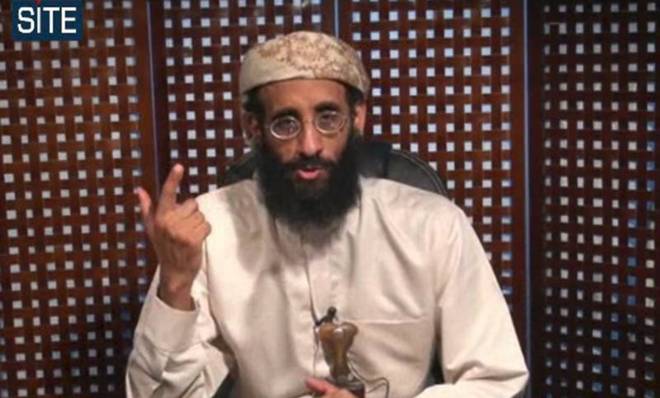The Obama drone memo is a brazen executive power grab
While there is much we still don't know about the legal rationale to target Anwar al-Awlaki, it's clear the administration blew off basic judicial oversights


A free daily email with the biggest news stories of the day – and the best features from TheWeek.com
You are now subscribed
Your newsletter sign-up was successful
After years of legal wrangling, the Department of Justice this week finally released the so-called drone memo — the legal justification for the killing of Yemeni-American cleric Anwar al-Awlaki by drone missile attack — to the ACLU and The New York Times in heavily redacted form. While there is still a lot we don't know about the rationale to assassinate this American citizen, the memo does affirm that the Obama administration was eager to grant itself extraordinary powers that appear to be in direct conflict with the Constitution.
The release of the memo has been a long time coming. At first, DOJ convinced courts in New York that the killing of Awlaki on Sept. 30, 2011, was a classified secret, despite the fact that it had been widely reported in the media. But after a stream of White House officials discussed such drone activities — and especially after the government officially released a "white paper" that summarized the memo — the Second Circuit Court of Appeals in New York ruled the government had to release the memo, as well as other materials relating to the killing.
The administration had intended to appeal the decision, but backed down in a deal with Sens. Rand Paul (R-Ky.) and Ron Wyden (D-Ore.) to win confirmation for David Barron, the memo's author, to the First Circuit Court of Appeals in Boston. Barron was acting head of DOJ's Office of Legal Counsel, which reviews the legality of executive branch actions, when he signed the memo on July 16, 2010.
The Week
Escape your echo chamber. Get the facts behind the news, plus analysis from multiple perspectives.

Sign up for The Week's Free Newsletters
From our morning news briefing to a weekly Good News Newsletter, get the best of The Week delivered directly to your inbox.
From our morning news briefing to a weekly Good News Newsletter, get the best of The Week delivered directly to your inbox.
The memo argued that Awlaki, whom the government alleged had helped plan the December 2009 underwear bomb attack on a Detroit-bound jet, was either a leader of al Qaeda or an associated force. That made him a legal target under the 2001 Authorization to Use Military Force, Barron argued.
Much of the memo considered whether a law prohibiting the murder of Americans overseas, 18 USC 1119, protected Awlaki. Barron uncontroversially argued that the law did not apply to the Department of Defense, because killing enemies was part of military service members' official duties.
That argument gets dicier when you consider the CIA, which had spearheaded the drone program. That's partly because members of the CIA, unlike members of the military, do not count as a privileged combatants who can legally wage war. Much of Barron's argument to give the CIA such powers remains redacted.
Also redacted is a section laying out the government's case against Awlaki, which is unfortunate, because there are inconsistencies in the government's public argument that Awlaki orchestrated the UndieBomb attack.
A free daily email with the biggest news stories of the day – and the best features from TheWeek.com
Importantly, the memo also doesn't include the government's discussion about what makes a terrorism suspect an "imminent threat," and the lengths to which the government must go to try to capture the suspect before it is deemed infeasible — both central standards in the government's claim to be able to kill Americans. (Those may appear in a February 2010 memo Barron also wrote to authorize Awlaki's killing.) For all we know, Obama's team watched a YouTube video of an Awlaki sermon and looked at a map of Yemen before deciding it was drone time.
But the government did leave unredacted a hint of the standard for review — and it is pretty shocking. Rather than speaking of probable cause — the standard a court would use before approving a mere wiretap on Awlaki— the memo instead weighs whether "a decision-maker could reasonably decide that the threat posed by [Awlaki]'s activities to United States persons is 'continued' and 'imminent.'" Not only does the memo approve bypassing due process, but it sets the standard unbelievably low for a decision taken with a lot of advance notice.
Despite the government hailing its own transparency, the fact is that the most important parts of the memo remain redacted. And most ironic, given the deal to appoint Barron to the First Circuit, is the administration's position on why courts can't even review the case against Awlaki.
A comparison of the memo with the white paper reveals that one section of the white paper does not appear in the memo. (This section may appear in that February 2010 memo, possibly along with the discussion of imminent threat and feasibility of capture; see page 41 of this highlighted memo for what remains redacted in the existing memo.)
In the white paper, that section explains why judges can't review this killing. "[U]nder the circumstances described in this paper, there exists no judicial forum to evaluate these constitutional considerations," DOJ wrote in a November 2011 memo after Awlaki's death. "Were a court to intervene here, it might be required inappropriately to issue an ex ante command to the President and officials responsible for operations with respect to their specific tactical judgment to mount a potential lethal operation against a senior operational leader of al-Qa'ida or its associated forces."
Judge Colleen McMahon, who in January 2013 originally ruled on the Freedom of Information Act suit brought by the ACLU and the Times, didn't agree. She noted that the Treason Clause — the means of dealing with traitors enshrined in our Constitution — is reserved for the courts, not the executive. "[T]he Treason Clause appears in the Article of the Constitution concerning the Judiciary — not in Article 2, which defines the powers of the Executive Branch," McMahon wrote. "This suggests that the Founders contemplated that traitors would be dealt with by the courts of law, not by unilateral action of the Executive."
Somehow, that very basic constitutional fact never made it into a memo secretly authorizing the killing of an American citizen — alleged to be a traitor — with no due process. Either Barron dealt with the question of judicial review, but not the Treason Clause, in his first memo, or he never dealt with it, and DOJ added that section in the white paper to make the review look more reasonable.
Either way, the guy who ignored the constitutional requirement about traitors — and in the process expanded executive power greatly — ended up getting a plush appointment to be a circuit court judge.
It's remarkable how lucrative denying the role of courts can be.
Marcy Wheeler is an independent journalist who covers national security and civil liberties. She writes as emptywheel at her eponymous blog, publishes at outlets including The Guardian, Salon, and The Progressive, and is the author of Anatomy of Deceit, a primer on the Scooter Libby CIA leak investigation.
-
 Local elections 2026: where are they and who is expected to win?
Local elections 2026: where are they and who is expected to win?The Explainer Labour is braced for heavy losses and U-turn on postponing some council elections hasn’t helped the party’s prospects
-
 6 of the world’s most accessible destinations
6 of the world’s most accessible destinationsThe Week Recommends Experience all of Berlin, Singapore and Sydney
-
 How the FCC’s ‘equal time’ rule works
How the FCC’s ‘equal time’ rule worksIn the Spotlight The law is at the heart of the Colbert-CBS conflict
-
 The billionaires’ wealth tax: a catastrophe for California?
The billionaires’ wealth tax: a catastrophe for California?Talking Point Peter Thiel and Larry Page preparing to change state residency
-
 Bari Weiss’ ‘60 Minutes’ scandal is about more than one report
Bari Weiss’ ‘60 Minutes’ scandal is about more than one reportIN THE SPOTLIGHT By blocking an approved segment on a controversial prison holding US deportees in El Salvador, the editor-in-chief of CBS News has become the main story
-
 Has Zohran Mamdani shown the Democrats how to win again?
Has Zohran Mamdani shown the Democrats how to win again?Today’s Big Question New York City mayoral election touted as victory for left-wing populists but moderate centrist wins elsewhere present more complex path for Democratic Party
-
 Millions turn out for anti-Trump ‘No Kings’ rallies
Millions turn out for anti-Trump ‘No Kings’ ralliesSpeed Read An estimated 7 million people participated, 2 million more than at the first ‘No Kings’ protest in June
-
 Ghislaine Maxwell: angling for a Trump pardon
Ghislaine Maxwell: angling for a Trump pardonTalking Point Convicted sex trafficker's testimony could shed new light on president's links to Jeffrey Epstein
-
 The last words and final moments of 40 presidents
The last words and final moments of 40 presidentsThe Explainer Some are eloquent quotes worthy of the holders of the highest office in the nation, and others... aren't
-
 The JFK files: the truth at last?
The JFK files: the truth at last?In The Spotlight More than 64,000 previously classified documents relating the 1963 assassination of John F. Kennedy have been released by the Trump administration
-
 'Seriously, not literally': how should the world take Donald Trump?
'Seriously, not literally': how should the world take Donald Trump?Today's big question White House rhetoric and reality look likely to become increasingly blurred
